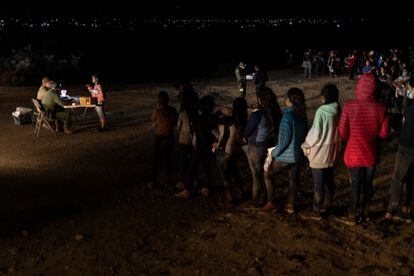A row of unaccompanied minors register with the US border patrol on May 14 in Texas. ADREES LATIF (REUTERS)
Thousands of people are arriving again in recent weeks at the borders of Mexico.
Their arrival in large groups continues.
They are mixed flows of Haitian, Central American, Caribbean and South American people, including a trickle of extra-regional migration from places as dissimilar as Angola, Senegal, Kyrgyzstan or Nepal.
In the first quarter of 2022 alone, just over 77,600 people have been made available to the immigration authority to start administrative processes, of which 15% are children and adolescents (NNA), and just over 3,000 of them are unaccompanied.
Between 1990 and 2020, North America became the destination of 59 million international migrants, comprising 20.9% of the total 281 million migrants in the world, according to the World Migration Report 2022.
Most of them see the United States as the final destination of their migration process, a decisive moment in their lives that, in many of these cases, is caused by poverty, climate change, uncertainty, political instability or an economic crisis. aggravated in the context of the pandemic.
In short, due to a multiplicity of causes that make the migratory phenomenon a complex and dynamic reality.
2021 was a record year in various aspects of migratory dynamics, highlighting the exponential increase in migratory flows to North America through the Darién Gap, the jungle region that separates Colombia and Panama.
In 2021, 38 percent of irregular entries in that region were women, while 17 percent were children and adolescents (NNA).
The migratory flows that reach the Darién continue to increase.
From January to April of this year, 19,092 entries were registered compared to 11,487 in the same period of 2021 (66.2% more).
Multilateralism takes on fundamental relevance to deal with a phenomenon that goes beyond borders and jurisdictional districts.
The way to build a bridge a little firmer for the desires of migrants will be analyzed this month in New York.
From May 17 to 20, under the auspices of the United Nations General Assembly, the International Migration Review Forum (FEMI) 2022 will be held. In this forum, leaders from around the world will review the progress of States regarding the implementation of the ten principles and the 23 objectives of the Global Compact for Safe, Orderly and Regular Migration (GMP), adopted in December 2018 in Marrakech, as well as the most pressing challenges on the migration agenda.
In a regional context gripped by violence and inequality, as evidenced even more by covid-19, we have the opportunity to analyze gaps and current challenges in migration matters for strategic coordination in measures to address them.
We are facing a historic milestone, an unprecedented opportunity to review how the commitments made on the migration issue materialize, as well as to identify the areas that require greater efforts to achieve safe, orderly, regular and beneficial migration in all latitudes of the planet from an approach based on shared responsibility.
From the United Nations Network for Migration in Mexico, made up of 14 United Nations agencies, we have carried out exchanges with representatives of civil society and other interested parties.
As a result, the demand for a comprehensive humanitarian response in close adherence to the principles of the Global Compact for Migration stands out.
The regional position was also discussed before the Review Forum at the Regional Conference on Migration (RCM), which launched an extraordinary Declaration before the FEMI urging the adoption of a "shared responsibility approach" to migration to "strengthen international cooperation, optimize the benefits of migration and contribute to improving the lives of migrants, their families and the communities of the countries of origin, transit, destination and return”.
More walls and the militarization of borders could lead to more irregular migration in large groups, under conditions of high risk and insecurity.
Hence, a broad regional vision that is committed to multilateralism and greater ambition linked to the Global Compact for Migration is necessary.
Only in this way will we understand that migrants are agents of positive change and that migration is vital for sustainable development, for prosperity, well-being and a dignified life for those of us who inhabit the region.
Subscribe here to the EL PAÍS América
newsletter
and receive all the key information on current affairs in the region
Dana Graber Ladek
is Head of Mission of the International Organization for Migration in Mexico (UN Migration) and Technical Secretary of the United Nations Network for Migration in Mexico.

